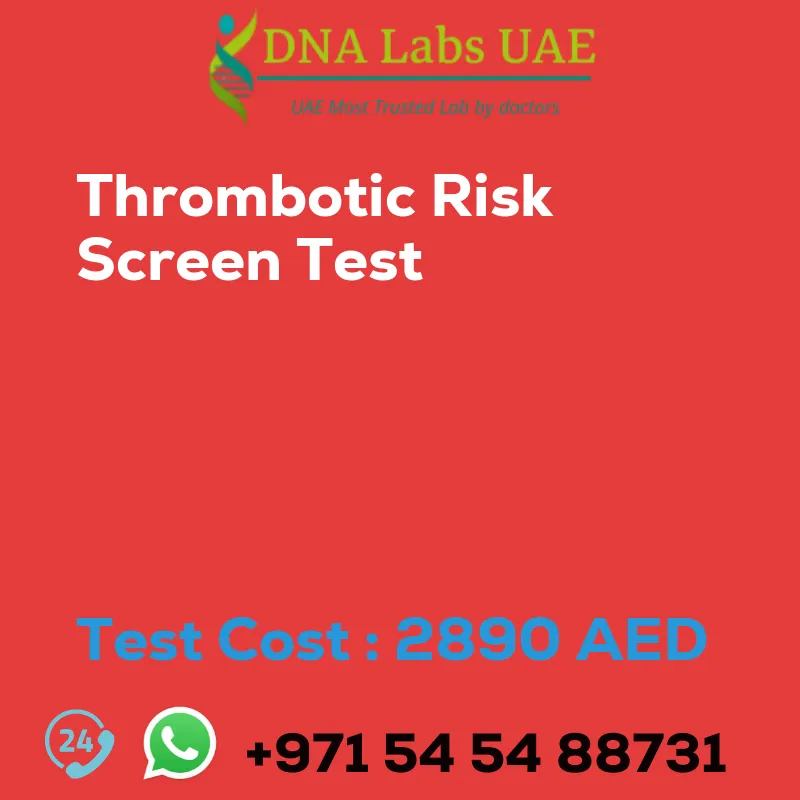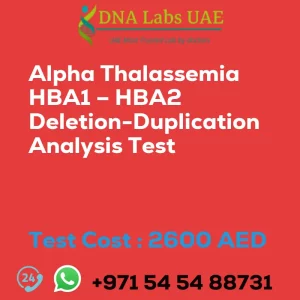THROMBOTIC RISK SCREEN Test
Test Name: THROMBOTIC RISK SCREEN Test
Components:
- Protein C Functional
- Protein S antigen, Free
- Antithrombin Activity Functional
- APCR
Price: 2890.0 AED
Sample Condition:
- 6mL whole blood in 2 Blue Top (Sodium Citrate) tubes.
- Mix thoroughly by inversion.
- Transport to Lab within 4 hours.
- If this is not possible, make PPP within 1 hour of collection as follows:
- Centrifuge sample at 3600rpm for 15 min. & transfer supernatant to a clean plastic tube.
- Centrifuge this supernatant again at 3600 rpm for 15 min. & finally transfer the supernatant (PPP) to 1 labelled clean plastic screw-capped vial.
- FREEZE IMMEDIATELY. Ship frozen. DO NOT THAW.
- Overnight fasting is preferred.
Report Delivery: 1 week
Method: Chromogenic, Immunoturbidimetry, Electromechanical Clot Detection
Test Type: Disorders of Coagulation
Doctor: Hematologist
Test Department: COAGULATION
Pre Test Information:
- Overnight fasting is preferred.
- Duly filled Coagulation Requisition Form (Form 15) is mandatory.
- It is recommended that patient discontinues Heparin for 1 day and Oral Anticoagulants for 7 days prior to sampling as these drugs may affect test results.
- Discontinuation should be with prior consent from the treating Physician.
Test Details:
The THROMBOTIC RISK SCREEN test is a diagnostic tool used to assess a person’s risk of developing blood clots, also known as thrombosis. This test is typically ordered for individuals who have a family history of blood clots or have experienced a previous clotting event.
The THROMBOTIC RISK SCREEN test evaluates various genetic and molecular markers that can indicate an increased risk of thrombosis. These markers include mutations in genes such as Factor V Leiden, prothrombin gene mutation, and methylenetetrahydrofolate reductase (MTHFR) gene mutation. Additionally, the test may also measure levels of certain proteins involved in blood clotting, such as antithrombin III, protein C, and protein S.
The results of the THROMBOTIC RISK SCREEN test can help healthcare providers determine the appropriate management and treatment strategies for individuals at risk of thrombosis. This may include lifestyle modifications, medication therapy, or preventative measures such as the use of blood thinners.
It is important to note that the THROMBOTIC RISK SCREEN test is not a definitive diagnostic tool for thrombosis. It is used as a screening tool to identify individuals who may be at an increased risk and may require further testing or intervention. A healthcare provider will interpret the test results in the context of an individual’s overall medical history and symptoms.
| Test Name | THROMBOTIC RISK SCREEN Test |
|---|---|
| Components | *Protein C Functional* Protein S antigen, Free*AntithrombinActivityFunctional*APCR |
| Price | 2890.0 AED |
| Sample Condition | 6mLwholebloodin2BlueTop (SodiumCitrate)tubes.Mixthoroughly byinversion.TransporttoLabwithin4 hours.Ifthisisnotpossible,makePPP within1hourofcollectionasfollows: Centrifugesampleat3600rpmfor15 min.&transfersupernatanttoaclean plastictube.Centrifugethissupernatant again at 3600 rpm for 15 min. & finally transferthesupernatant(PPP)to1 labelled cleanplasticscrewcappedvial. FREEZE IMMEDIATELY. Ship frozen. DONOTTHAW.Overnightfastingis preferred. Duly filled Coagulation Requisition Form (Form 15) is mandatory. Itisrecommendedthatpatient discontinues Heparin for 1 day and Oral Anticoagulants for 7 days prior tosamplingasthesedrugsmayaffect testresults.Discontinuationshouldbe with prior consent from the treating Physician. |
| Report Delivery | 1 week |
| Method | Chromogenic, Immunoturbidimetry, Electromechanical Clot Detection |
| Test type | Disorders of Coagulation |
| Doctor | Hematologist |
| Test Department: | COAGULATION |
| Pre Test Information | Overnight fasting is preferred. Duly filled Coagulation Requisition Form (Form 15) is mandatory. It is recommended that patient discontinues Heparin for 1 day and Oral Anticoagulants for 7 days prior to samplingas these drugs may affect test results. Discontinuation should be with prior consent from the treating Physician. |
| Test Details | The THROMBOTIC RISK SCREEN test is a diagnostic tool used to assess a person’s risk of developing blood clots, also known as thrombosis. This test is typically ordered for individuals who have a family history of blood clots or have experienced a previous clotting event. The THROMBOTIC RISK SCREEN test evaluates various genetic and molecular markers that can indicate an increased risk of thrombosis. These markers include mutations in genes such as Factor V Leiden, prothrombin gene mutation, and methylenetetrahydrofolate reductase (MTHFR) gene mutation. Additionally, the test may also measure levels of certain proteins involved in blood clotting, such as antithrombin III, protein C, and protein S. The results of the THROMBOTIC RISK SCREEN test can help healthcare providers determine the appropriate management and treatment strategies for individuals at risk of thrombosis. This may include lifestyle modifications, medication therapy, or preventative measures such as the use of blood thinners. It is important to note that the THROMBOTIC RISK SCREEN test is not a definitive diagnostic tool for thrombosis. It is used as a screening tool to identify individuals who may be at an increased risk and may require further testing or intervention. A healthcare provider will interpret the test results in the context of an individual’s overall medical history and symptoms. |







